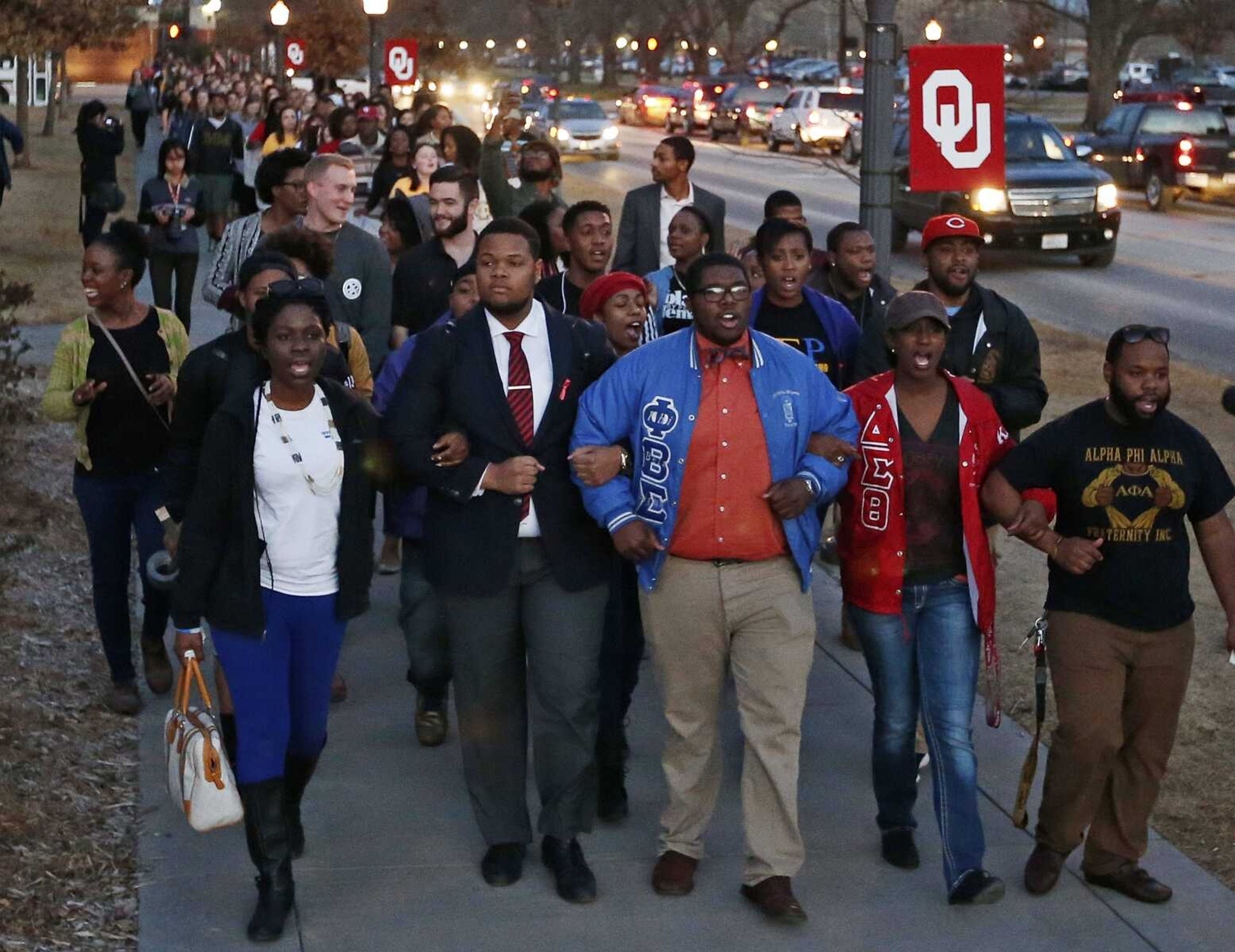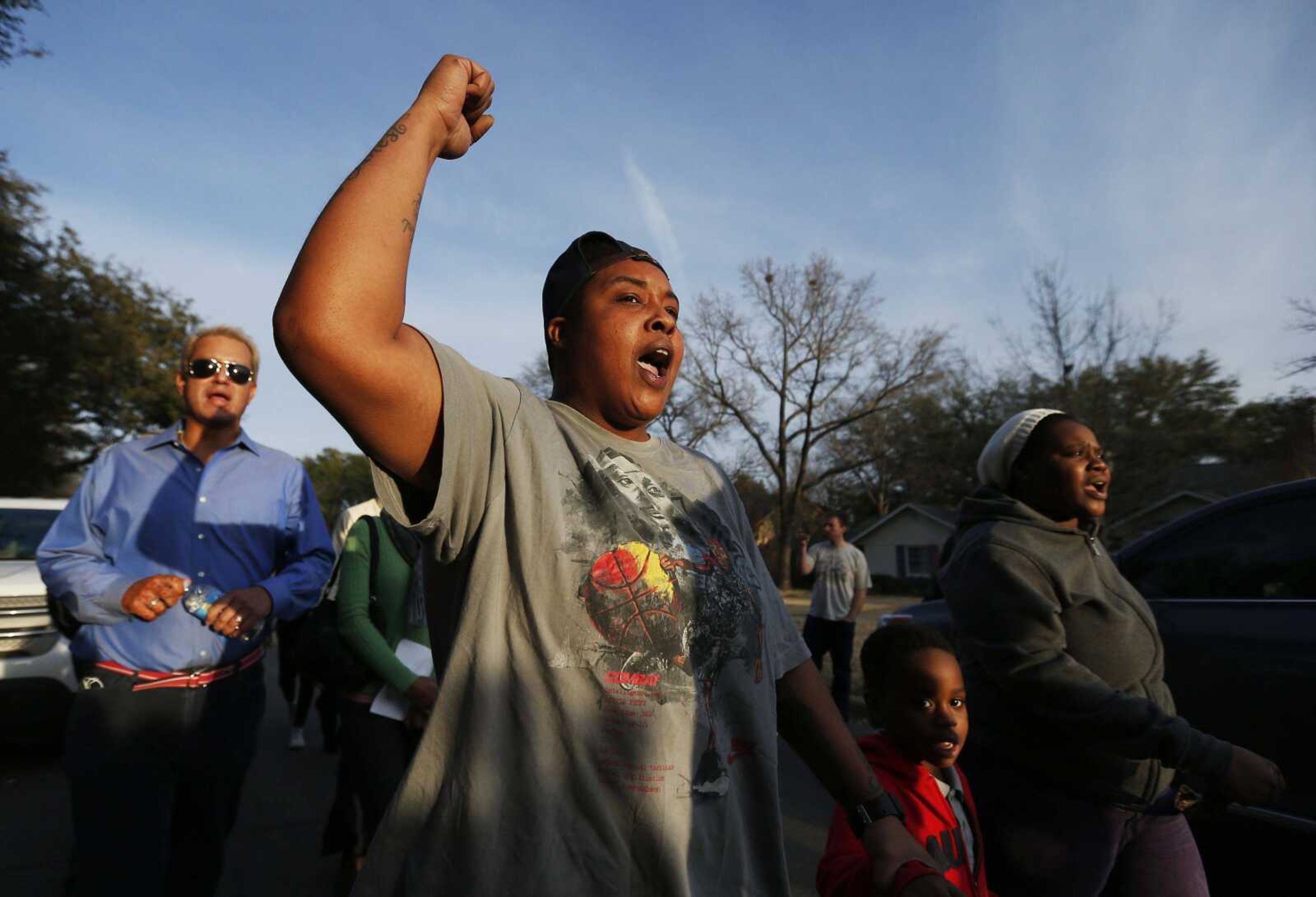Oklahoma is latest to address race problems at fraternities
WASHINGTON -- Their reputations sullied by race-tainted incidents, many colleges are clamping down on campus fraternities. Despite some swift and tough actions by schools -- and in some cases, public humiliation -- episodes such as the racist chants by members of the Sigma Alpha Epsilon chapter at the University of Oklahoma keep surfacing...
WASHINGTON -- Their reputations sullied by race-tainted incidents, many colleges are clamping down on campus fraternities. Despite some swift and tough actions by schools -- and in some cases, public humiliation -- episodes such as the racist chants by members of the Sigma Alpha Epsilon chapter at the University of Oklahoma keep surfacing.
In recent years, numerous other fraternities have been suspended and students expelled from school for racially tinged parties or behavior, such as hanging nooses or shouting racial profanities.
"All too often the outcry has been, 'Look at those bad apples we need to root out,"' said Nolan L. Cabrera, a professor in the Center for the Study of Higher Education at the University of Arizona. "When in fact the conversation we need to have is, 'Why is this occurring on such a widespread level throughout the country?'"
Many incidents come to light after the students themselves post pictures or videos online, drawing public attention; others are reported by onlookers or whistleblowers.
Either way, "it's hard to ignore a current on many, many campuses of behaviors that are just offensive and disgusting at the far end and maybe just lack common sense at the other end," said Kevin Kruger, president of NASPA: Student Affairs Administrators in Higher Education, a professional organization.

For example, Sigma Alpha Epsilon in December suspended all activity at Clemson University in South Carolina after white students dressed as gang members at a "Cripmas" party. That same month, Phi Delta Theta halted its chapter at the University of Pennsylvania for issuing a holiday card with members posing with what it called a Beyonce sex doll.
Other examples:
- Arizona State University banned Tau Kappa Epsilon last year after its Martin Luther King Jr. Day party had guests flashing gang signs and holding watermelon-shaped cups.
- Kappa Sigma suspended its Duke University chapter in 2013 after students held an international-themed party that mocked Asians.
- Sigma Phi Epsilon shut its doors last year at the University of Mississippi after three of its members draped a Confederate banner and placed a noose around the statue of the school's first black student.
- Lehigh University suspended Sigma Chi in April 2014 and expelled members after racial slurs were spray-painted and eggs thrown at a multicultural residence hall.
Sororities have had similar problems.
In 2014, Chi Omega closed its Penn State chapter in connection with a photo appearing on the Internet showing members wearing sombreros and fake mustaches and holding offensive signs. One read, "Will mow lawn for weed + beer."
The University of Alabama announced in fall 2013 more than 20 minority women were being offered membership in historically all-white sororities after accusations surfaced of black women being denied membership.
At Oklahoma, the university quickly expelled two students and banned Sigma Alpha Epsilon last week after fraternity members were filmed engaging in a racist chant that referenced lynching and indicated black students never would be admitted to the university's chapter.
Two students identified in the video have apologized publicly.
The national fraternity condemned the incident and started investigating racism allegations at universities in Louisiana and Texas after hearing young men at two schools sang or knew of the same racist chant.
But the damage was done. The school's president, former Sen. David Boren, D-Okla., said the fraternity "won't be back -- at least not as long as I'm president of the university."
Fraternities, both historically white and those mostly made up of minorities, long have been a fixture of university life. Defenders point to the system's charitable works and social and professional benefits for members.
Research by Nella Van Dyke, a professor at University of California at Merced, found ethnic and racially biased hate crimes are more likely to be reported at predominantly white campuses and those with a large fraternity population. She said the problems are not everywhere, but they exist.
Beyond racism, fraternities in recent years had to confront issues of sexual assault, binge drinking and hazing among their members.
"I think many fraternities have a culture that makes them prone to conflict and kind of bigoted interactions, whether it's against women or against minorities," Van Dyke said.
Matthew Hughey, a sociology professor at the University of Connecticut who studies racial identity, estimated about 3 percent or 4 percent of the members of the majority-white fraternities and sororities are nonwhite.
"We shouldn't be surprised when unequal and segregated organizations say racist things. Of course they do," Hughey said.
The national fraternities are working to eliminate this kind of behavior and to train members to speak up instead of being pressured to conform, said Peter Smithhisler, president and chief executive officer of the North-American Interfraternity Conference.
"It's about the constant re-education of our membership," Smithhisler said. "And we have to be diligent in addressing our community members, sharing with them our expectations, teaching them about our values and acceptable behaviors and holding individuals accountable when they stray from that."
Boren's actions may become the standard among university officials, said West Virginia University President E. Gordon Gee, who froze fraternities' activities last fall after the death of an 18-year-old student at a fraternity house.
"We can't blame all the ills in society, or the ills in universities, on fraternities and sororities, but we can have a high level of expectation, because very often these are students who are leaders on our campuses," Gee said.
Connect with the Southeast Missourian Newsroom:
For corrections to this story or other insights for the editor, click here. To submit a letter to the editor, click here. To learn about the Southeast Missourian’s AI Policy, click here.










